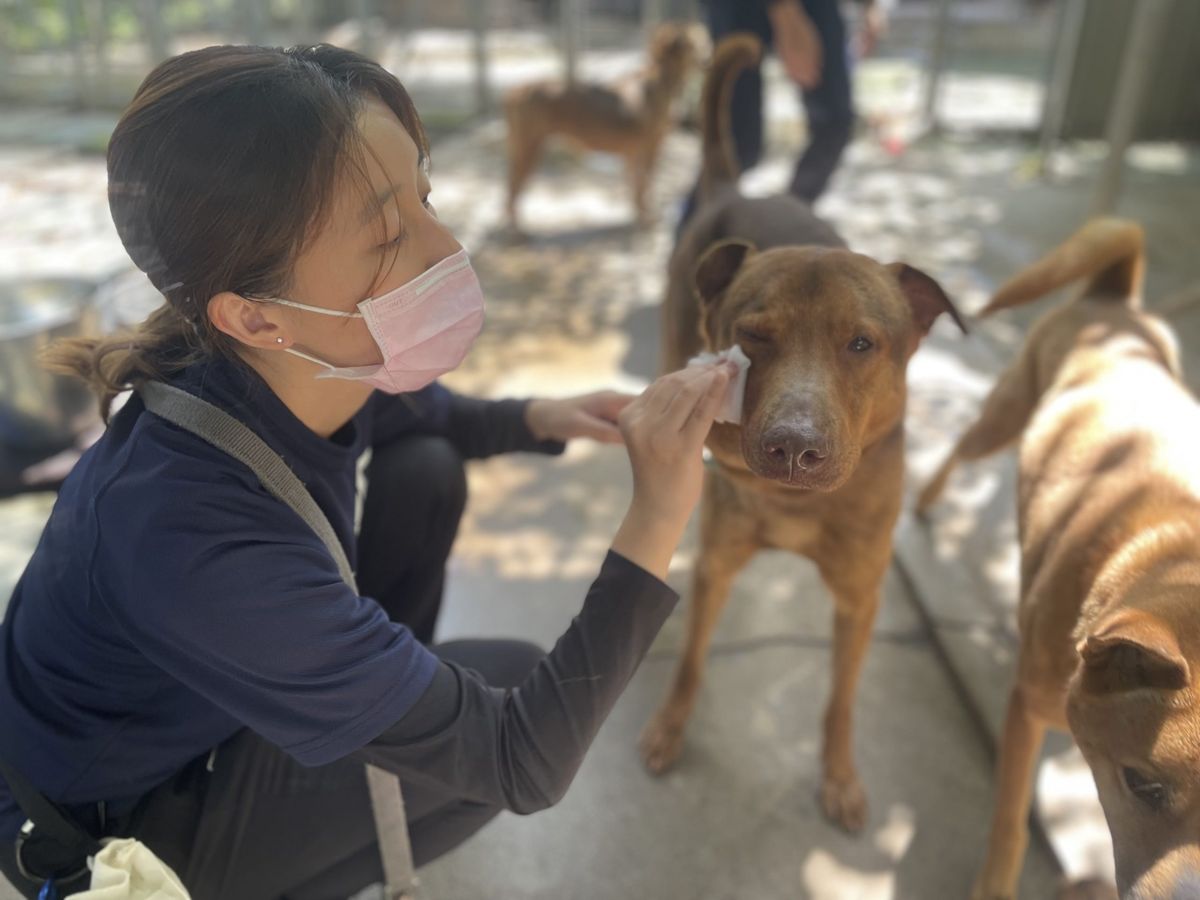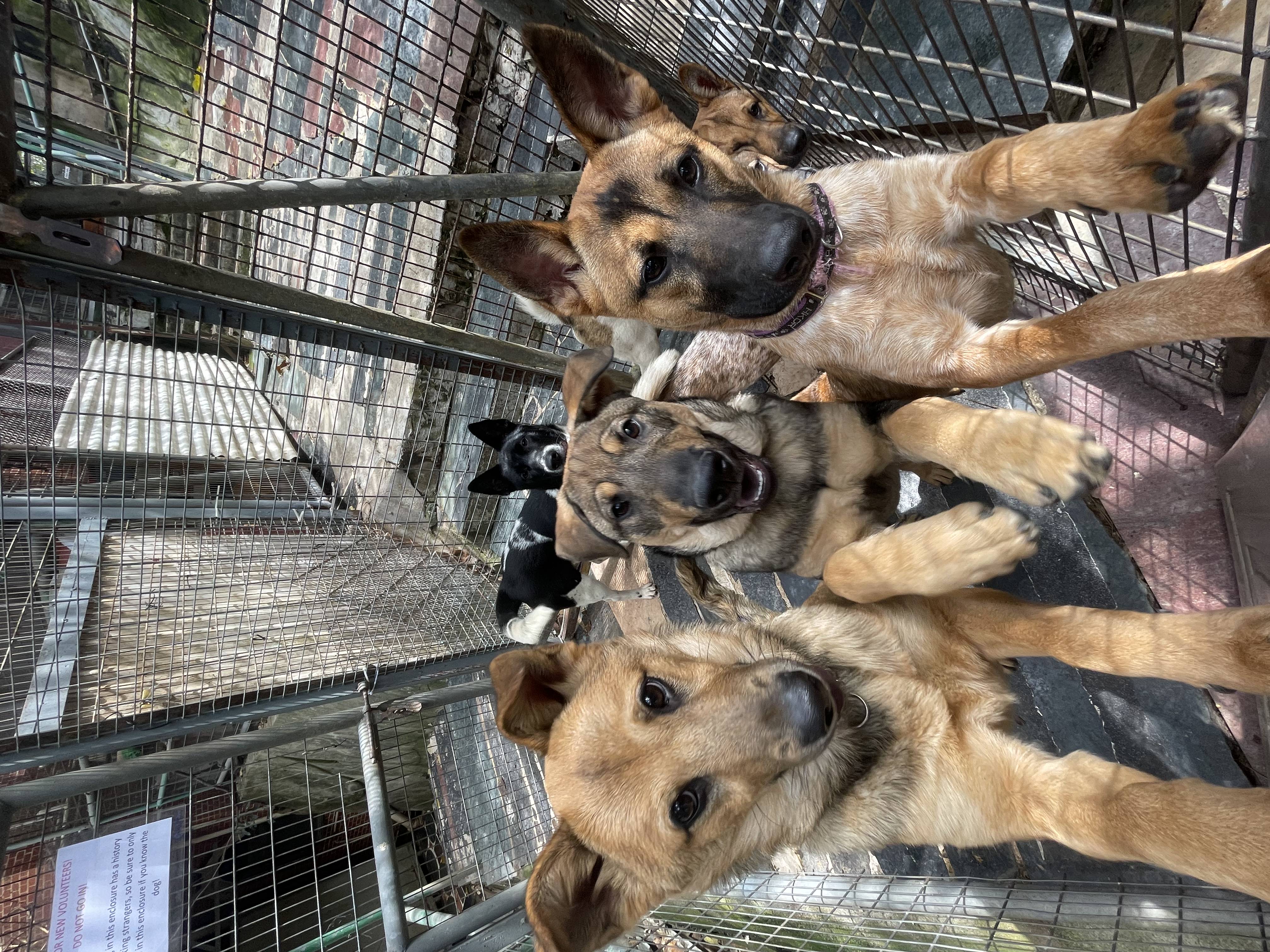Hong Kong Dog Rescue’s mission to save shelter dogs across the city

A few minutes every morning is all you need.
Stay up to date on the world's Headlines and Human Stories. It's fun, it's factual, it's fluff-free.
Founded in 2003, Hong Kong Dog Rescue (HKDR) has been created for one reason, which is to save dogs and puppies from the Hong Kong Government’s Agriculture, Fisheries and Conservation Department (AFCD) Animal Management Centres. These unsheltered animals have only four days to live unless they are rehomed.
The organization is a proud, no-kill organization, meaning no dog that comes under its care will be euthanized. Rescue workers do everything in their power to prepare the dog for a new, happy life with a permanent family by providing health checks and medical care, positive reinforcement training, foster care and socialization.
TMS connected with Eva Sit, who began as a volunteer and now works for HKDR, to learn about her journey with the rescue and the rescue situation in Hong Kong. From adopting at Hong Kong Dog Rescue, debunking myths and discussing the ethics of breeders to getting involved by volunteering, Sit walks us through the rescue situation in the city.
About Hong Kong Dog Rescue

While HKDR rescues most of its dogs and puppies from AFCD centers, they also rescue ex-breeding dogs. These dogs, no longer profitable to the breeder, usually arrive at the rescue in poor condition because of insufficient care and the exhausting demands of breeding.
HKDR also coordinates temporary foster care for dogs so they can experience living in a home environment before permanent adoption. The foster care process also allows dogs to recover from trauma from past living conditions or abandonment. The rescue works with dogs with behavioral problems using positive reinforcement to prepare them for adoption and help them learn to trust again.
In addition to rescue and rehoming, HKDR makes education its mission. It opened the Education & Training Center in July 2013, opposite the Ap Lei Chau Homing Center. The center offers workshops and classes geared toward improving the relationship between owner and pet.
Adopting a dog

Like any relationship, Sit believes adopting a pet is all about commitment and compatibility.
“Usually, we ask potential adopters to fill out an adoption questionnaire,” explains Sit. “We ask them about their experiences, their home situation, their expectations or preferences. We stress a lot on making sure the dog and the family are a good match in terms of lifestyle.
“For example, if someone really enjoys outdoor activities, they really love running, we would recommend them to adopt a high-energy dog. And, for example, if a family has elderly people or young children at home, we would probably recommend adopting a more mature dog.”
HKDR encourages those considering adopting a dog to ask themselves several questions to determine their readiness for such a commitment. For example, do you have enough space? How much time and exercise can you give to the dog? Will the dog have company during the day, and are you prepared for the mess?
Dogs are “man’s best friend” and make wonderful companions, but they do require time, patience and attention, and veterinary care is an additional expense adopters must account for.
Because the volunteers and workers at HKDR have spent so much time with the dogs available for adoption, they can be exceptionally helpful at matching potential adopters with the perfect companion.
The rescue also offers post-adoption support, so even after you take your new best friend home, HKDR provides ongoing resources like access to a fully qualified, US-trained Certified Professional Dog Trainer and discounted group training courses.
As the world reevaluates how we want to live our lives post-pandemic, many have opted to make drastic lifestyle changes, including moving house and changing marital status. Sit also urges pet owners to consider how these changes will affect their dogs.
She especially wants those considering adoption to think seriously about the commitment of caring for an animal. As the point person for abused and unwanted dogs, Sit sees the damage ill-prepared pet owners inflict on animals.
“Of course, even though a lot of people do love their dogs, there are a lot of irresponsible dog owners,” explains Sit. “I guess it comes down to commitment because your personal situation can change a lot.”
Debunking mongrel myths and examining the ethics of breeders

Sit believes the most pervasive myth in Hong Kong is that mongrels, or mixed breed dogs, are aggressive. “That’s totally not true,” Sit insists.
“In fact, most of the dogs we have here are mongrels, and they are really extremely loyal and they can be really sweet and friendly once they know you. With the younger generation, we have started to realize mongrels are really nice too. They are very loyal. And the best thing about them is that they are very unique, and they have [fewer] genetic issues compared to pure breeds.”
As for purebreds, there’s still a booming market for them. Kim Kavin, author of “The Dog Merchants: Inside the Big Business of Breeders, Pet Stores, and Rescuers,” estimates that the breeding industry generates around US$11 billion annually worldwide. Kavin also argues that the value placed on purebreds, as opposed to rescued or “shelter” dogs, really only comes down to marketing.
For example, Kavin notes the Territorio de Zaguates shelter in Costa Rica, which hired a creative agency to develop and market its campaign of “unique breeds." The campaign rebranded dogs most of us might consider mongrels or mutts with “breed” names like the “chubby-tailed German Dobernauzer" and “white-chested Dachweiler." As a result, adoptions increased by 1,400%, even though nothing about the dogs themselves had changed.
“From our point of view, a lot of people, when they choose to get a dog, the first thing they would look at is the breed of the dog,” says Sit. “They are very specific about the breed of the dog. And from our point of view, that is pretty pointless because every dog has a different personality, and it doesn’t have a lot to do with the breed to be honest. [The focus on the breed] seems to be more about looks.
“Maybe some purebred dogs look better on social media or Instagram, and so the biggest wonder we have is, if just in Hong Kong alone we have thousands of dogs getting killed every year just because they are homeless, then why? Why would it even be logical to produce more puppies just because you want a specific breed? It’s very unfair to the dogs who aren’t lucky enough to be born purebred dogs.”
Breeders are kept in business by people looking for purebred or specific breeds of dogs, and this becomes a vicious cycle that harms the animals involved. “There will still be business as long as people are still buying dogs,” Sit points out.
Most countries have laws on the books to regulate animal breeding, but there is still a booming black market allowing dog breeders to operate outside of these rules and restrictions meant to protect the wellbeing of the animals.
Puppy mills are being busted worldwide, but the negative effects of irresponsible dog breeders are finally coming to light. Recently, for example, a Norwegian court banned the breeding of two flat-faced dog breeds, British Bulldogs and Cavalier King Charles Spaniels, ruling that breeding these dogs was a violation of the country’s Animal Welfare Act. The court found that selective breeding of these dogs led to a “disease guarantee” that equates to cruelty.
When it comes to the ethics of breeders, Sit doesn’t mince words. She believes recent breeder regulations in Hong Kong are not enough.
“A lot of breeders are not ethical, and we can say that because we are at the very end of their production cycle,” explains Sit. “We take in the unwanted, used, damaged dogs, and we know how unethical the whole business is … You can never know [whether a business is ethical or not] because people will always choose to show you the good side, and it’s a business to them. It’s about profit, so you can never be sure.”
Volunteering at HKDR
Volunteers are the lifeblood of non-profit organizations like these. “I guess the rescue never stops,” says Sit. If you aren’t sure whether you’re up caring for an animal, volunteering offers a first step toward finding the answer.
“The amazing thing about Hong Kong Dog Rescue is that we have a lot of dedicated volunteers,” enthuses Sit. “Most of them come in to help walk the dogs we have at our biggest center. We have over 300 dogs there, and all 300 dogs have to be walked every day, at least two times a day, which is a lot of work and requires a lot of manpower.
“Volunteers come in for say three or four hours to take as many dogs out as possible. And it’s not even just about the exercise … Our main goal is to help them socialize and help them gain confidence in front of people and in front of new involvement.”
This initial exposure to friendly and caring volunteers helps each dog get ready for its forever home. But, volunteering in this type of rescue isn’t just about caring for and playing with its residents. Fundraising is hugely important to help the rescue operate, provide food and veterinary care to the dogs and continue to take in new rescues from centers where they are essentially on “death row.”
According to Sit, the number of volunteers working with HKDR dwindled a bit during the pandemic, but those numbers are starting to return to normal as people learn to live with the virus. However, fundraising is still sluggish because of an inability to hold as many fundraising events as they usually would.
“Still, we are really affected on the fundraising parts,” says Sit. “Because the government is banning all the large-scale events and also because of all the social restrictions [and] rules.”
If you’d like to help HKDR by donating, you can do so on its website. Donations of HK$100 or above are tax-deductible. There are also many volunteer opportunities, from dog-walking to handyman work to photography and other tasks. Businesses and schools can also register for group volunteering by filling out the form on the website.
Sit emphasizes that, unfortunately, many people don’t realize that rescue dogs often have the best personalities. “I don’t know why that is,” she says, “but, you know, it seems like [after] being kept in cages for years, they are just so grateful for the love, for the care and for the new life.
“And that’s the sad part of it. But we’re happy to be able to help.”







Comments ()